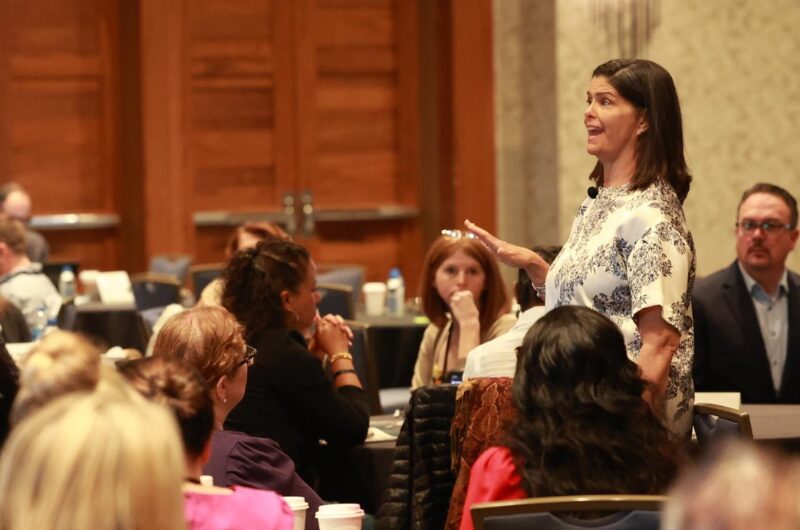


Nearly 200 financial education practitioners from credit unions and partner organizations came together this week for three days during CU FinHealth24 in Aurora, CO to learn, engage, and deep-dive into what it means to holistically serve members with financial health-and-wellbeing solutions that transform lives.
You can view conference photos here! Additionally, view daily event posts at #CUFinHealth24 (LinkedIn).
Co-hosted by the California and Nevada Credit Union Leagues, National Credit Union Foundation (NCUF), and Cornerstone Foundation at the Gaylord Rockies Resort and Convention Center from April 29 – May 1, this year’s eighth annual CU FinHealth24 delved into the credit union movement’s evolving philosophy and strategy when it comes to financial health and wellbeing at the organic, individual-member level.
Coming from credit unions and industry affiliates spanning the West Coast to East Coast, attendees absorbed insights as they immersed themselves in an enriching experience and exploration that brought together today’s “who’s who” in credit union financial literacy and education. This year, measurable data and comprehensive studies on the financial pulse of credit union members from all walks of life — representing different communities — were in focus as financial education practitioners increasingly take an integrative and inclusionary approach to solving financial insecurity in society.
Leveling-Up Service, Technology, and CUs’ Measurable Impacts
Credit unions have been committing to financial health goals for the past several years, assessing what’s working and what’s not, addressing specific financial wellbeing issues, and taking measurable actions to move the needle on community financial health.
“What began eight years ago as a small annual gathering has developed into one of the most highly educational and cooperative credit union industry conferences around the nation that focuses exclusively on the financial health and wellbeing of credit union members,” said Larry Palochik, executive vice president for the Leagues.
This year’s event spotlighted the fruits of that progress as credit unions and their partners in the educational and digital-service realms continue cultivating an ongoing, shared responsibility for the financial consumer at a micro level. Recurring attendees and newcomers alike shared how their eyes have been opened. They realize how financial wellbeing is part of a broader tapestry incorporating economic, lifestyle, and health problems that are highly intertwined.
Conference attendees have continued to level-up their service and technology outreach in financial education, as well as incorporate a more holistic understanding of their members’ lives. The conference hosts were proud to see credit unions growing in this important and sometimes under-looked space in financial services that receives increasing attention each year as credit union members are taught what it means to live financially healthier lives.
National Credit Union Foundation Executive Director Gigi Hyland said she was thrilled about the success of this year’s CU FinHealth conference. “Bringing together top industry leaders to delve into the crucial role of credit unions in enhancing financial-wellbeing-for-all shows our collective commitment to driving positive change,” Hyland said. “The insightful discussions, innovative strategies, and collaborative spirit showcased during this event reaffirm our dedication to empowering individuals through strengthened financial health.”
Cornerstone Foundation Executive Director Courtney Moran said it was “incredibly inspiring” to be surrounded by credit union professionals and practitioners who all share the same vision of achieving financial wellbeing for all. “From understanding how to successfully mine your data to sharing meaningful financial coaching tips and techniques, the event offered crucial takeaways for credit unions in various stages of their financial wellness journeys,” Moran said. “I am honored to be part of an event that ignites such passion.”
Commit, Assess & Learn, Plan — and then Act
“How have credit unions changed? Are we looking inward, or only outward, to address individuals’ financial challenges today?”
That was the opening question from Brenton Peck, director of financial services solutions for Financial Health Network. He urged financial wellbeing practitioners to realize that credit unions cannot think the same strategies for members will work today as in the past.
“In certain respects, we have not adjusted,” Peck said. “What are we doing? Where are we going? And how do we get there? We need to adjust.”
Peck’s comments were only the beginning. During Monday morning’s breakout sessions, attendees learned to commit, assess, learn, plan, and act. They explored how to convince credit union leadership of the return on investment in financial wellbeing (focusing on metrics), learned about financial health linked to demographics, discovered how to develop financial wellbeing from the ground up, and gleaned from successful peers’ data, products, services, and coaching.
Hyland and Financial Health Program Manager Christine Hickey introduced the FinHealth Hub to attendees — a dynamic and evolving resource to put financial-wellbeing-for-all into action. “How do you ensure your credit union is ready to serve members where they’re currently at?,” Hyland said. “Our FinHealth Hub is where you can take what you’ve learned here and dive deep into a master-class format to commit, plan, act, and live-out our mission.”
Breakout groups during the FinHealth Hub brainstorm session asked attendees to identify the biggest challenges in putting financial health and wellbeing strategies into motion for their members from a senior management and leadership planning, communication, and execution perspective. During round-robin discussions later that day, attendees also told event sponsors how they can fine-tune their services in supporting credit unions’ financial health and wellbeing initiatives.
Leaders wrapped up the first day with “Go Big or Go Broke,” a life-size board game developed by Royal CU that leaders can take home to teach financial education in a way that’s anything but boring! Players took turns exploring financial themes with trivia, decision-making, and random-chance encounters. They answered financial education questions based on real decisions they may be facing, showing the impact their financial decisions can have.
‘Financial Wellbeing for All,’ Inclusion Exercises, and More
Day two of CU FinHealth24 launched by having attendees share their impactful moments. Some takeaways?
First, focus on “culture, culture, culture” when implementing financial health and wellbeing initiatives. The idea is “not who we are — but who we should be.” There is no one-size-fits-all solution, but if you’re changing your members’ lives, “that’s what we should be striving for,” one speaker noted. Additionally, “anything worth doing isn’t worth doing alone.” Attendees agreed that they have a nationwide team of peers they can reach out to and rely on.
Adrian Alejandre (senior vice president of lending for Education CU), Victor Corro (CEO of Coopera), and Andy Bandyopadhyay (CEO of Attune) discussed how two credit unions acted upon their members’ ethnic, demographic, and financial health make-up as part of an NCUF grant opportunity. Where are your members at? What do they experience? How can you leverage financial scoring and demographic data to “get your leadership on board”? The more credit unions can partner to make data accessible to their peers, the better. Being intentional about financial wellbeing and inclusion is a long-term journey.
Next — in “What Do Small Dollar Loans and Nuclear Submarines Have in Common?” — QCash CEO Seth Brickman discussed how credit unions can break the cycle of financial destruction for the financially distressed through technology. “The reality of a submarine is, it’s people helping people” through loans for life events, specialty circumstances, first responders, pre-approved purchases, and small-dollar lending programs, he said. “People are experiencing more-month-than-money. They don’t have funds to meet obligations. But just because some don’t have a qualifying credit score, it doesn’t mean they don’t have the same needs as others.”
In “Widening the Lens: An Inclusion Exercise,” attendees broke into exercise groups on design-thinking with Samira Salem, vice president of diversity/equity/inclusion for America’s Credit Unions, and Zach Christensen, executive director of CU Pride. The audience developed a mindset of empathy (understanding member needs), defining issues (identifying member problems), ideation (exploring possible solutions), prototyping (creating low-scale solutions), and testing (refining those solutions). Some examples: what can your credit union do to ensure economic security and financial access for single-women households, the gig-workforce marketplace, and foster care youth?
Later, a panel of college students discussed how credit unions are perfectly situated to educate junior and high school students about financial literacy through app gamification, summer weeklong programs, first-generation parent/household outreach, and finances and budgeting intertwined with holding a job. “We know the marketplace is predatory, and this age and socioeconomic demographic are prey for many institutions in the financial services sector,” said Dennis Paul, vice president of government affairs and strategic partnerships for Elevations CU, as he moderated the panel with Jenna McFarlane (Bellco CU) and Dr. Maria Castro Barajas (University of Colorado—Boulder).
Lastly, five “Financial Wellbeing for All” breakout sessions during the afternoon kept attendees on their toes. They heard from speakers and experts on financial coaching, accelerating trust and co-creation in community relations and outreach, and reaching more credit union members through effectively leveraging alternative-loan underwriting models. They also learned about utilizing financial health and wellbeing data measurement trends, as well as planning and executing a “Financial Wellbeing for All” strategy.
‘Ideation Into Action: Taking it Home’
Make financial health goals simple and achievable. Build member rapport. Be the “connector” your community — and if you can’t, find others who you can work with to serve hard-to-reach populations. Don’t let your credit union’s small budget be a roadblock — you can still collaborate with nonprofit organizations to make a financial impact locally. Strategy and execution must work hand-in-hand as you elevate your mindset to incorporate health-building within wealth-building for members.
These were some of the closing themes on Wednesday. In “Ideation Into Action: Taking it Home,” attendees shared examples of financial wellbeing “initiatives” versus project ownership. This included refining a credit union’s purpose statement, developing financial health systems, building best practices, fostering staff cultural opportunities, and giving frontline employees the right tools to make an immediate connection.
How does a credit union ask its team to focus on financial wellbeing when they feel so stretched already? How can your staff make members feel more engaged through the “Financial Wellbeing For All” spirit? Getting support from the CEO and board of directors — as well as utilizing the National Credit Union Foundation’s FinHealth Hub — is essential.
Thank You to Our Outstanding Event Sponsors
The hosts of this year’s conference would like to thank all CU FinHealth24 sponsors! They include:
2855 East Guasti Rd., Suite 202
Ontario, CA 91761
909.212.6000
1201 K. St., Suite 1050
Sacramento, CA 95814-3992
916.325.1360
c/o Great Basin FCU
9770 South Virginia Street
Reno, NV 89511-5941
202.638.5777 www.cuna.org
www.dfpi.ca.gov
Clothilde “Cloey” V. Hewlett — 415.263.8500
fid.state.nv.us
702.486.4120 (Las Vegas)
775.684.2970 (Carson City)